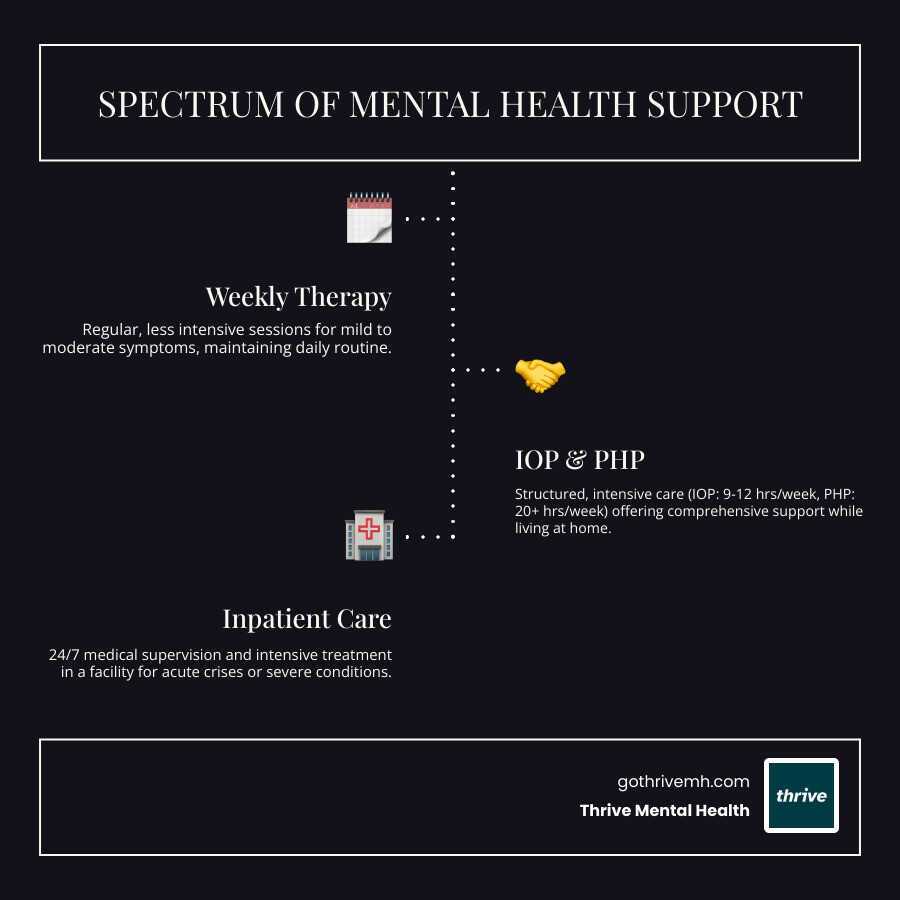Finding the Best Outpatient Program for Adults

Outpatient program for adults: Best Guide 2025
Why an Outpatient Program for Adults Might Be Your Missing Link
If you’re searching for an outpatient program for adults, you’re likely facing a gap between weekly therapy and full hospitalization. Here’s what you need to know:
Quick Answer: Outpatient Programs for Adults
- Intensive Outpatient Programs (IOP): 9-12 hours/week, 3-5 days, live at home, continue work/school
- Partial Hospitalization Programs (PHP): 20+ hours/week, 5-6 days, more intensive medical monitoring
- Best For: Depression, anxiety, substance use, trauma, eating disorders when weekly therapy isn’t enough
- Cost: Most major insurance plans cover IOP/PHP (Cigna, Optum, Florida Blue, Medicare, TRICARE)
- Success Rates: 91%+ see improvement in depression/anxiety; 79% no longer experience suicidal ideation
- Format Options: Virtual or in-person, with evening and weekend scheduling available
If you’re in crisis right now, please call or text 988 to reach the Suicide & Crisis Lifeline. You are not alone.
You’re juggling work, school, or family while trying to manage anxiety, depression, or substance use that weekly therapy isn’t resolving. You don’t need hospitalization, but you know you need more than one hour a week.
That’s exactly what outpatient programs for adults are designed for—structured, evidence-based care that fits around your life, not the other way around.
This guide covers what an outpatient program for adults involves, who it’s for, how to use insurance like Medicare, and how to find a quality program in Florida or virtually. We’ll cover success rates, schedules, and what comes after treatment.
I’m Anna Green, LMHC, LPC, Chief Clinical Officer at Thrive Mental Health. With years of experience designing accredited outpatient programs, I’ll explain how this level of care can help you bridge the gap between just surviving and truly thriving.

Find more about outpatient program for adults:
Understanding Outpatient Levels of Care: IOP vs. PHP
When searching for an outpatient program for adults, you’ll find two main options: Intensive Outpatient Programs (IOPs) and Partial Hospitalization Programs (PHPs). Think of them as a bridge between weekly therapy and inpatient hospitalization, offering structured care while you live at home.
The key difference is time commitment and intensity. PHPs are more intensive, while IOPs offer a more flexible schedule to balance with work or school.
Here’s how they compare side-by-side:
| Feature | Partial Hospitalization Program (PHP) | Intensive Outpatient Program (IOP) |
|---|---|---|
| Time Commitment | 20+ hours per week | 9-12 hours per week |
| Typical Schedule | 5-6 days a week, 5-6 hours per day | 3-5 days a week, 3-4 hours per day |
| Level of Care | More intensive; step-down from inpatient or alternative to hospitalization | Less intensive than PHP; more than traditional weekly therapy |
| Best For | Acute symptoms, significant functional impairment, need for daily structure and monitoring | Stable enough to live at home, maintain some responsibilities, but need more support than weekly therapy |
| Medical Supervision | Daily medical/psychiatric monitoring | Weekly psychiatric consultation and medication management |
For a deeper dive into which option might be right for your situation, check out our guide on PHP vs. IOP.
What is an Intensive Outpatient Program (IOP)?
An Intensive Outpatient Program (IOP) provides 9-12 hours of therapeutic support per week over 3-5 days, offering more structure than weekly therapy without requiring you to pause your life. You live at home and can continue work or school.
IOP is ideal for those whose symptoms aren’t improving with weekly sessions, who are stepping down from a higher level of care, or who need focused treatment for depression, anxiety, trauma, or substance use. At Thrive Mental Health, our IOPs combine group therapy, individual therapy, and family sessions to create a comprehensive support system.
Notably, Medicare Part B covers IOP services requiring at least 9 hours per week, highlighting its value. Learn more on our page: What is an IOP?
What is a Partial Hospitalization Program (PHP)?
A Partial Hospitalization Program (PHP) is the most intensive level of outpatient care, just below inpatient hospitalization. It’s for adults with acute symptoms who need daily structure and medical monitoring but are stable enough to live at home.
A PHP involves 20+ hours of treatment per week over 5-6 days, functioning like a day hospital. It’s often used as a step-down from inpatient care or as an alternative to hospitalization, providing intensive support while you remain in your community.
A PHP is a good fit if you’re experiencing significant functional impairment and need more structure than an IOP can offer. Find more on our PHP Mental Health Services page.
What to Expect from an Outpatient Program for Adults
Starting an outpatient program for adults can feel like stepping into unfamiliar territory—but understanding what lies ahead can transform that uncertainty into confidence. These programs are built around one core principle: providing you with comprehensive, structured care that doesn’t require you to put your entire life on pause.

Conditions Treated and Success Rates
Note: If you or someone you know is in crisis or struggling with thoughts of self-harm, please call or text 988 to reach the Suicide & Crisis Lifeline. You are not alone.
Outpatient programs are designed to treat a wide range of challenges when weekly therapy isn’t enough. At Thrive Mental Health, we offer personalized care for complex conditions, including:
- Depression (major depressive, perinatal, postpartum)
- Anxiety Disorders (generalized anxiety, panic disorder, social anxiety, OCD)
- Substance Use Disorders (alcohol, opioids, marijuana, etc.)
- Trauma and PTSD (acute, chronic, complex)
- Eating Disorders (anorexia, bulimia, binge eating)
- Bipolar Disorder (I and II)
- Personality Disorders (including borderline personality disorder)
- Other concerns like self-harm, suicidal ideation, dissociative disorders, gender dysphoria, and neurodivergence (ADHD, ODD).
The results are significant. Our data shows:
- 91%+ of clients see improvement in their most severe symptoms.
- 93% report improvement in depression and 90% in anxiety.
- 79% of clients who started with suicidal ideation no longer experience it post-treatment.
- A 64% decrease in missed work or school days.
These outcomes show that clients don’t just feel better—they regain function in their daily lives.
A Typical Program Schedule and Duration
A key benefit of an outpatient program for adults is its flexibility. Programs are designed to fit around your work, school, and family life.
- IOP Schedule: Typically 3-5 days a week for 3-4 hours per session. Many programs, including ours, offer evening and weekend options to fit your schedule.
- PHP Schedule: More intensive, requiring 5-6 days a week for 5-6 hours per day, providing daily structure while you return home at night.
The average program duration is 9 to 12 weeks, but your treatment plan is individualized. You’ll work with your therapist to set goals and determine the right timeline for your recovery, ensuring you’re equipped with lasting skills before transitioning to a lower level of care.
Therapies and Services Offered in an adult outpatient program
Our programs combine evidence-based therapies with personalized, compassionate care. Your treatment plan is customized and may include:
- Core Therapies: We use proven modalities like Cognitive Behavioral Therapy (CBT) to reframe negative thoughts, Dialectical Behavior Therapy (DBT) for emotional regulation, Acceptance and Commitment Therapy (ACT) to align actions with values, and Motivational Interviewing to build commitment to change.
- Program Components:
- Group Therapy: The core of our programs, providing a safe space to connect with peers and practice new skills.
- Individual Therapy: One-on-one sessions with your primary therapist for deep, personalized work.
- Family Counseling: Helps improve communication and build a strong support system at home.
- Medication Management: Integrated psychiatric evaluation and monitoring to stabilize symptoms.
- Skill-Building & Holistic Services: You’ll participate in workshops on stress management, relapse prevention, and life skills. Depending on the program, services may also include art therapy, yoga, and meditation.
This holistic approach builds a strong foundation for lasting recovery. Learn more about The Benefits of an Intensive Outpatient Program.
Is an Adult Outpatient Program Right for You?
Figuring out whether an outpatient program for adults is the right choice can be overwhelming. The key is finding a level of care that is intensive enough to make real progress but flexible enough to fit your life.

Who is a Good Candidate for an Outpatient Program?
An outpatient program for adults (IOP or PHP) is ideal for those who need more than weekly therapy but don’t require 24/7 residential care. You might be a good candidate if you:
- Are stepping down from inpatient care and need a structured transition back to daily life.
- Find that weekly therapy isn’t enough to manage your symptoms or make progress.
- Want to maintain work, school, or family roles while in treatment, taking advantage of flexible evening and weekend schedules.
- Are motivated to participate actively in your recovery process.
- Have a stable and supportive living environment to return to each day.
These programs are effective for adults (18-64) facing challenges like anxiety, depression, trauma, and substance use.
Virtual vs. In-Person: Which is Better for an outpatient program for adults?
A common question is whether to choose an in-person or virtual program. Both are highly effective; the best choice depends on your personal needs and lifestyle.
Benefits of In-Person Programs:
- Face-to-Face Connection: Direct interaction with therapists and peers can feel more personal and grounding.
- Structured Environment: A dedicated healing space away from home distractions helps create a clear boundary between therapy and daily life.
- Organic Social Support: Informal connections with peers before and after sessions can reduce feelings of isolation.
Benefits of Virtual Programs:
- Accessibility: Overcomes barriers like distance, transportation, or mobility issues, providing care from the comfort of home.
- Convenience: Ideal for busy schedules, eliminating commute time and offering flexibility to log in from anywhere.
- Continuity of Care: Allows you to stay connected to your treatment plan even if you travel or have an unpredictable schedule.
At Thrive, we offer both in-person and Virtual Intensive Outpatient Programs, ensuring you receive the same high-quality, personalized care regardless of format. The best option is the one that feels most comfortable and sustainable for you. Our team can help you decide what’s right for your situation.
Navigating Costs, Insurance, and Finding a Program
Understanding the financial and logistical aspects of an outpatient program for adults is a crucial step. We believe financial concerns should never stand between you and quality mental healthcare. Let’s break down what you need to know.
How Much Do Outpatient Programs Cost?
The cost of an outpatient program for adults varies based on several factors:
- Location: Costs differ by region, such as between Miami, Orlando, or Jacksonville, Florida.
- Program Type: More intensive PHPs (20+ hours/week) generally cost more than IOPs (9-12 hours/week).
- Insurance Coverage: Your specific plan, deductible, and co-insurance will be the biggest factor in your out-of-pocket cost.
Many programs, including Thrive Mental Health, offer financial assistance or sliding scale options. We recommend inquiring directly about costs and payment plans, as we believe care should be accessible to everyone.
Using Insurance for Treatment: Cigna, Optum, and More
Most major insurance providers cover intensive outpatient programs for adults. At Thrive Mental Health, we are in-network with many carriers, including Cigna, Optum, Florida Blue, TRICARE, and Aetna.
Medicare Part B also covers intensive psychiatric care, including IOPs that provide at least 9 hours of therapy per week. After meeting your deductible, you’ll pay a percentage of the Medicare-approved amount.
Verifying your benefits is the most important step. You can call your provider, or let our admissions team do it for you. We can help you understand your plan’s coverage, including deductibles and co-pays, so there are no financial surprises.
How to Find a Quality Program
Finding a quality outpatient program for adults is about finding the right fit. Here are key steps to take:
- Get Referrals: Ask your doctor or current therapist for recommendations.
- Check Your Insurance: Use your provider’s directory to find in-network facilities and save money.
- Search Online: Use terms like “IOP Florida” or “outpatient program for adults in Miami.” Our guide on Finding Quality IOP Programs Near Me can help.
- Verify Accreditation: Look for accreditation from bodies like The Joint Commission, which signifies high standards for safety and care.
- Ask Questions: Inquire about treatment philosophy, staff qualifications, therapies offered, success rates, and scheduling flexibility. A quality program will be transparent.
Finding the right program is crucial for your recovery. You deserve expert, compassionate care.
Frequently Asked Questions about Outpatient Programs for Adults
Here are answers to common questions about choosing an outpatient program for adults.
Can you work while in an intensive outpatient program?
Yes. Most IOPs are designed for working adults. The goal of outpatient care is to fit treatment around your life. Many programs, including Thrive Mental Health, offer evening, weekend, and virtual sessions so you can maintain your work, school, and family commitments while getting the care you need.
What is the success rate of IOP?
Outcomes are very positive. Our data shows that more than 91% of clients report significant improvement in depression and anxiety symptoms. Furthermore, 79% of adults who entered treatment with suicidal ideation no longer experience it after completing the program. We also see a 64% decrease in missed work or school days, showing that IOP helps people regain function in their daily lives.
How do I know if I need IOP or just regular therapy?
Consider an IOP if:
- Weekly therapy isn’t enough and you continue to struggle between sessions.
- You’re struggling to function at work, school, or home.
- You are transitioning from a higher level of care, like an inpatient program, and need continued support.
The best way to know for sure is to get a professional assessment. Our admissions team can help determine the right level of care for you. Call us at 561-203-6085 or start a benefits check to discuss your options.
Your Next Step: From Program to Lasting Recovery
Completing an outpatient program for adults is a major achievement, but it’s the start of the next phase of recovery, not the end. At Thrive Mental Health, we ensure a smooth transition back to daily life.
Discharge planning begins on day one. We create a personalized continuing care plan that may include:
- Step-down care: Transitioning from PHP to IOP, or from IOP to weekly therapy, at a pace that feels right for you.
- Ongoing therapy: Continuing with individual sessions, medication management, or group therapy to reinforce your skills.
- Alumni and peer support: Connecting with our alumni program or other support networks to stay grounded and accountable.
Our goal is to equip you with the tools and support systems for long-term success. We want you to thrive, not just survive.
Thrive Mental Health offers virtual and hybrid IOP/PHP with flexible evening options to fit your life. Our expert-led, evidence-based care is custom to your unique needs.
Ready for support? Thrive offers virtual and hybrid IOP/PHP with evening options. Verify your insurance in 2 minutes (no obligation) → Start benefits check or call 561-203-6085. If you’re in crisis, call/text 988.